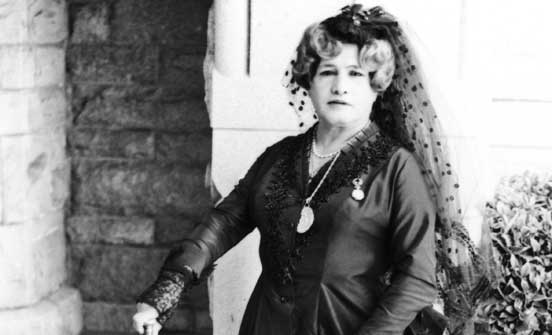
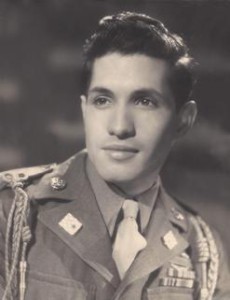 José Julio Sarria was born on December 12 in either 1922 or 1923 in San Francisco, raised primarily by a single mother.
José Julio Sarria was born on December 12 in either 1922 or 1923 in San Francisco, raised primarily by a single mother.
Following his service in World War II, Sarria studied to become a school teacher while working as a cocktail waiter at the Black Cat Cafe, which was starting to become known as a gay bar.
The Black Cat holds a significant place in the gay history of San Francisco — and California. When the bar’s liquor license was suspended for serving “known homosexuals,” the bar sued, and in 1951 the California Supreme Court ruled in Stoumen v. Reilly that homosexuals have the right to congregate and that a bar’s licenses couldn’t be suspended solely because of having a gay clientele. It response, the state passed a constitutional amendment creating the Bureau of Alcohol Beverage Control, and San Francisco began passing legislation that would allow them to bust gay establishments for other behavioral issues. Bars could be shut down for allowing people of the same sex to kiss, or hold hands, or dance together. Individuals could be arrested for impersonating the opposite sex “with the intent to deceive,” an attempt to crack down on drag queens.
The Nightengale of Montgomery Street
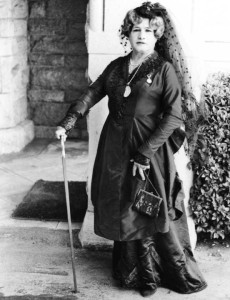
Around this time, Sarria was caught up in a sting operation for solicitation. Although he argued that he was simply in the wrong place at the wrong time, Sarria was convicted and his hopes of becoming a teacher were dashed. Desperate for work, he entered a drag contest in Oakland at a bar called Pearl’s and came in second place. He started to perform in drag in San Francisco while continuing to work at the Black Cat.
One night at the Black Cat, the piano player happened to play Bizet’s opera Carmen and Sarria began to sing along while serving drinks. This led to scheduled shows at the Black Cat and Sarria soon became nicknamed “The Nightengale of Montgomery Street.”
Sarria quickly became a mentor and protector of the City’s fledgling gay community. When police raided gay bars, he encouraged arrested patrons to plead not guilty and demand a jury trial. He advised drag queens to wear a label stating “I am a boy” so that could not be accused of intending to deceive others into thinking they were the opposite sex. When the bar closed, he would lead the patrons outside to sing “God Save Us Nelly Queens,” serenading the gay men in jail across the street who had been arrested in sting operations earlier that evening.
The Emergence of Gay Politics
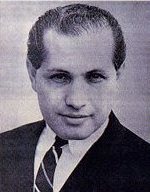 In 1960 or ’61, Sarria became a co-founder of the League for Civil Education. Later in 1961, he became the first openly gay candidate for public office in the United States when he filed papers to run for the San Francisco Board of Supervisors. He almost won by default; when the city’s political bosses realized that there were only five candidates for five open seats, including Sarria, they put the word out to drum up 29 more candidates. Sarria finished ninth with 6,000 votes, demonstrating the growing political strength of the City’s gay community.
In 1960 or ’61, Sarria became a co-founder of the League for Civil Education. Later in 1961, he became the first openly gay candidate for public office in the United States when he filed papers to run for the San Francisco Board of Supervisors. He almost won by default; when the city’s political bosses realized that there were only five candidates for five open seats, including Sarria, they put the word out to drum up 29 more candidates. Sarria finished ninth with 6,000 votes, demonstrating the growing political strength of the City’s gay community.
He helped co-found the Tavern Guild in 1962, an organization representing gay bars that became the first gay business association in the U.S. In 1963, he co-founded the Society for Individual Rights (SIR).
The Widow Norton
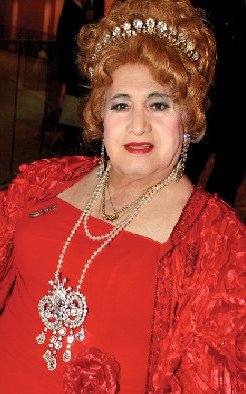 In 1964, Sarria was crowned the Queen of the Beaux Arts Ball by the Tavern Guild. Declaring that he was already a queen, Sarria proclaimed himself Jose I, First Empress of San Francisco, the Widow Norton — the fictionalized widow of Joshua Norton, the colorful San Francisco character who had proclaimed himself Emperor of the United States, and who had died nearly 85 years before Sarria proclaimed herself to be his widow.
In 1964, Sarria was crowned the Queen of the Beaux Arts Ball by the Tavern Guild. Declaring that he was already a queen, Sarria proclaimed himself Jose I, First Empress of San Francisco, the Widow Norton — the fictionalized widow of Joshua Norton, the colorful San Francisco character who had proclaimed himself Emperor of the United States, and who had died nearly 85 years before Sarria proclaimed herself to be his widow.
The proclamation led to the formation of another organization, the Imperial Court, which annually elects a new Empress and Emperor to lead the court in philanthropic work. The Imperial Court has now grown into an international organization, with Portland, Oregon in 1971 establishing the first court outside of San Francisco.
Sarria presided as the Imperial Court’s Queen Mother until he abdicated in 2007, passing the crown to the heir presumptive, Nicole Murray-Ramirez, who assumed the title Empress Nicole the Great, Queen Mother of the Americas.
A State Funeral
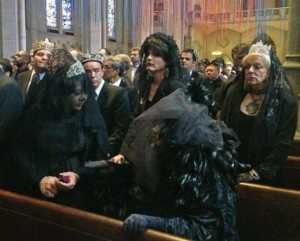 The Widow Norton left San Francisco in 1996, living in Palm Springs for a decade before moving to New Mexico. He died of adrenal cancer on August 19, 2013 at the age of 89 or 90. His funeral was a state occasion with over a thousand mourners in full mourning attire packing Grace Cathedral on September 6, 2013. In attendance were members of the Imperial Court from around the world along with local and state elected officials, including California State Senator Mark Leno, former San Francisco mayor Art Agnos, San Francisco Treasurer Jose Cisneros, and members of the San Francisco Board of Supervisors.
The Widow Norton left San Francisco in 1996, living in Palm Springs for a decade before moving to New Mexico. He died of adrenal cancer on August 19, 2013 at the age of 89 or 90. His funeral was a state occasion with over a thousand mourners in full mourning attire packing Grace Cathedral on September 6, 2013. In attendance were members of the Imperial Court from around the world along with local and state elected officials, including California State Senator Mark Leno, former San Francisco mayor Art Agnos, San Francisco Treasurer Jose Cisneros, and members of the San Francisco Board of Supervisors.
He was laid to rest in a grave at the foot of Emperor Norton’s, which Sarria had purchased decades earlier.